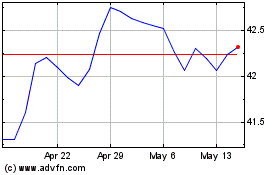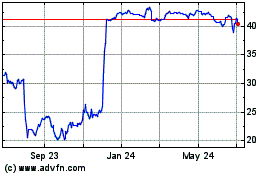Cerevel Therapeutics (Nasdaq: CERE), a company dedicated to
unraveling the mysteries of the brain to treat neuroscience
diseases, today announced positive topline results from its pivotal
Phase 3 TEMPO-3 trial for tavapadon, the first and only D1/D5
receptor partial agonist being studied as a once-daily treatment
for Parkinson’s disease. The TEMPO-3 trial evaluated the efficacy,
safety and tolerability of tavapadon as an adjunctive therapy to
levodopa (LD) in adults. The trial met its primary endpoint –
patients treated with tavapadon adjunctive to LD experienced a
clinically meaningful and statistically significant increase of 1.1
hours in total “on” time without troublesome dyskinesia compared to
those treated with LD and placebo (1.7 hours vs. 0.6 hours, p
<0.0001). A statistically significant reduction in “off” time,
the key secondary endpoint, was also observed for the tavapadon
treatment arm.
“Tavapadon’s novel mechanism of action, which selectively
activates the D1/D5 dopamine receptors, has demonstrated the
potential to provide people living with Parkinson’s disease the
right balance of motor control, safety and tolerability,” said
Raymond Sanchez, M.D., chief medical officer, Cerevel Therapeutics.
“We are highly encouraged with the results announced today, and
look forward to sharing additional data later this year from the
monotherapy trials, TEMPO-1 and TEMPO-2, as we seek to evaluate
tavapadon’s potential benefit to people living with Parkinson’s
disease.”
Tavapadon was generally well tolerated. The safety profile
observed in the TEMPO-3 trial was consistent with prior clinical
trials of tavapadon. The majority of adverse events reported were
mild to moderate in severity.
“Parkinson’s disease is the fastest growing neurodegenerative
disorder in the world, and a significant need exists for a new
treatment option that provides the right balance of dopamine
signaling and delivers sustained motor control without the
burdensome side effects associated with current treatments," said
Hubert H. Fernandez, M.D., global principal investigator and the
James and Constance Brown endowed chair in movement disorders,
professor of neurology and director at the Center for Neurological
Restoration at Cleveland Clinic. “The results from the TEMPO-3
trial are particularly exciting as they demonstrate that tavapadon
has the potential to offer an important new option for individuals
living with this chronic, debilitating disease.”
Full results from the TEMPO-3 study will be submitted for
presentation at future medical meetings and used to support
regulatory submissions of tavapadon as a treatment for Parkinson’s
disease. Topline results from the Phase 3 monotherapy trials for
tavapadon, TEMPO-1 and TEMPO-2, are expected in the second half of
2024.
About TEMPO Clinical Development Program
The TEMPO clinical development program is evaluating the
efficacy, safety and tolerability of tavapadon across a broad
Parkinson’s population, including two monotherapy Phase 3 trials
(TEMPO-1 and TEMPO-2) and one adjunctive Phase 3 trial (TEMPO-3).
Cerevel is also conducting a fourth, open-label extension (OLE)
trial (TEMPO-4) to assess the long-term safety and tolerability of
tavapadon.
TEMPO-3 was a Phase 3 double-blind, randomized,
placebo-controlled, parallel-group, flexible-dose, 27-week trial to
evaluate the efficacy, safety and tolerability of tavapadon as an
adjunctive therapy to LD for advanced Parkinson's disease. Patients
were provided with a home diary to assess their motor function
status (Hauser diary). The primary endpoint was change from
baseline in the total “on” time without troublesome dyskinesia
based on the two-day average of the self-completed Hauser diary.
Key secondary endpoints included change from baseline in total
daily “off” time, change from baseline in total “on” and “off” time
at earlier timepoints in the trial, and change from baseline in the
Movement Disorder Society - Unified Parkinson's Disease Rating
Scale (MDS-UPDRS) Part I, II and III Scores.
A total of 507 adults between the ages of 40-80 were enrolled in
the trial. All had a confirmed diagnosis of Parkinson’s disease,
were experiencing motor fluctuations and were on a stable dose of
LD for at least 4 weeks prior to screening. Patients were
randomized to receive either tavapadon adjunctive to LD, titrated
to 5-15 milligrams, or placebo and LD, orally and once-daily.
More information on the trial can be found on
www.clinicaltrials.gov (NCT04542499).
About Tavapadon
Tavapadon is the first and only selective D1/D5 receptor partial
agonist in development for Parkinson’s disease and is currently
being studied as a once-daily medicine for use as both a
monotherapy and as an adjunctive therapy to LD. Tavapadon is
designed to selectively and optimally activate D1/D5 receptors to
potentially provide the right balance of motor control, safety and
tolerability for patients. By selectively activating D1/D5 dopamine
receptors along the nigrostriatal pathway, tavapadon has the
potential to offer the right balance of dopamine signaling to
improve motor control while avoiding D2/D3 overstimulation, which
is believed to underlie many of the side effects of current
dopamine agonists. Additionally, as a partial agonist with a
24-hour half-life enabling once-daily dosing, tavapadon may avoid
hyperactivation of the dopamine receptors, which can lead to
troublesome dyskinesias.1,2
About Parkinson’s Disease
Parkinson’s disease is a chronic neurodegenerative disorder. It
primarily results in progressive and debilitating motor symptoms,
including decreased bodily movement, slowness of movement,
rigidity, tremors and postural instability, all of which result
from the loss of dopamine-producing neurons in the brain.3 A
significant need exists for a new treatment option that has the
right balance of dopamine signaling in order to provide sustained
motor control without side effect tradeoffs across the disease
spectrum.4,5 As of 2022, nearly 1 million individuals in the U.S.
are estimated to be affected by Parkinson’s disease, which is
expected to increase to over 1.6 million by 2037.6,7
About Cerevel Therapeutics
Headquartered in Cambridge, Mass., Cerevel Therapeutics is
dedicated to unraveling the mysteries of the brain to treat
neuroscience diseases. The company is tackling diseases by
combining its deep expertise in neurocircuitry with a focus on
targeted receptor subtype selectivity and a differentiated approach
to pharmacology. Cerevel Therapeutics has a diversified pipeline
comprised of five clinical-stage investigational therapies and
several preclinical compounds with the potential to treat a range
of neuroscience diseases, including schizophrenia, Alzheimer’s
disease psychosis, epilepsy, panic disorder and Parkinson’s
disease.
On December 6, 2023, Cerevel announced that it had entered into
an agreement to be acquired by AbbVie. Cerevel continues to expect
the merger to close in the middle of 2024, subject to receipt of
regulatory approvals and other customary closing conditions
specified in the merger agreement.
For more information, visit www.cerevel.com.
Special Note Regarding Forward-Looking
Statements
This press release contains forward-looking statements that are
based on management’s beliefs and assumptions and on information
currently available to management. In some cases, you can identify
forward-looking statements by the following words: “may,” “will,”
“could,” “would,” “should,” “expect,” “intend,” “plan,”
“anticipate,” “believe,” “estimate,” “predict,” “project,”
“potential,” “continue,” “ongoing” or the negative of these terms
or other comparable terminology, although not all forward-looking
statements contain these words. These statements involve risks,
uncertainties and other factors that may cause actual results,
levels of activity, performance or achievements to be materially
different from the information expressed or implied by these
forward-looking statements. Although we believe that we have a
reasonable basis for each forward-looking statement contained in
this press release, we caution you that these statements are based
on a combination of facts and factors currently known by us and our
projections of the future, about which we cannot be certain.
Forward-looking statements in this press release include, but are
not limited to, statements about the potential attributes and
benefits of our product candidates, including tavapadon’s potential
to provide the right balance of motor control, safety and
tolerability for people living with Parkinson’s disease; the
format, timing and objectives of our product development activities
and clinical trials, including timing for topline results from
TEMPO-1 and TEMPO-2; the ability of TEMPO-3 data to support
regulatory submissions of tavapadon as a treatment for Parkinson’s
disease; the ability to compete with other companies currently
marketing or engaged in the development of treatments for relevant
indications; the size and growth potential of the markets for
product candidates and ability to serve those markets; the rate and
degree of market acceptance of product candidates, if approved;
plans for presenting additional data from TEMPO-3 at a future
medical meeting; and the anticipated closing date of the AbbVie
transaction. We cannot assure you that the forward-looking
statements in this press release will prove to be accurate.
Furthermore, if the forward-looking statements prove to be
inaccurate, the inaccuracy may be material. Actual performance and
results may differ materially from those projected or suggested in
the forward-looking statements due to various risks and
uncertainties, including, among others: clinical trial results may
not be favorable; uncertainties inherent in the product development
process (including with respect to the timing of results and
whether prior results will be predictive of future results); the
impact of COVID-19 and the post-COVID landscape on the timing,
progress and results of ongoing or planned clinical trials; our
ability to recruit and enroll suitable patients in our clinical
trials, including the effectiveness of mitigation measures; whether
and when, if at all, our product candidates will receive approval
from the FDA or other regulatory authorities, and for which, if
any, indications; competition from other biotechnology companies;
uncertainties regarding intellectual property protection; the
ability of the parties to consummate the proposed merger between
Cerevel and AbbVie on the timeline anticipated or at all and the
possibility that various closing conditions for the merger may not
be satisfied or waived, including the failure to receive any
required regulatory approvals from any applicable governmental
entities (or any conditions, limitations or restrictions placed on
such approvals); the occurrence of any event, change or other
circumstance that could give rise to the termination of the merger;
and other risks identified in our SEC filings, including those
under the heading “Risk Factors” in our Annual Report on Form 10-K
filed with the SEC on February 27, 2024, and our subsequent SEC
filings. In light of the significant uncertainties in these
forward-looking statements, you should not regard these statements
as a representation or warranty by us or any other person that we
will achieve our objectives and plans in any specified time frame,
or at all. The forward-looking statements in this press release
represent our views as of the date of this press release. We
anticipate that subsequent events and developments will cause our
views to change. However, while we may elect to update these
forward-looking statements at some point in the future, we have no
current intention of doing so except to the extent required by
applicable law. You should, therefore, not rely on these
forward-looking statements as representing our views as of any date
subsequent to the date of this press release.
Media Contact:Anna RobinsonCerevel
Therapeuticsanna.robinson@cerevel.com
Investor Contact:Matthew CalistriCerevel
Therapeuticsmatthew.calistri@cerevel.com
1 Riesenberg R, Werth J, Zhang Y, Duvvuri S, Gray D. PF-06649751
efficacy and safety in early Parkinson’s disease: a randomized,
placebo-controlled trial. Ther Adv Neurol Disord.
2020;13:17562864209112962 Sohur US, Gray DL, Duvvuri S, Zhang Y,
Thayer K, Feng G. Phase 1 Parkinson’s disease studies show the
dopamine D1/D5 agonist PF-06649751 is safe and well tolerated.
Neurol Ther. 2018;7(2):307-319.3 DeMaagd G, Philip A. Parkinson's
Disease and Its Management: Part 1: Disease Entity, Risk Factors,
Pathophysiology, Clinical Presentation, and Diagnosis. P T. 2015
Aug;40(8):504-32. PMID: 26236139; PMCID: PMC4517533.4 Cacabelos R.
(2017). Parkinson's Disease: From Pathogenesis to Pharmacogenomics.
International journal of molecular sciences, 18(3), 551.
https://doi.org/10.3390/ijms180305515 Varanese S, Birnbaum Z, Rossi
R, Di Rocco A. Treatment of advanced Parkinson's disease.
Parkinsons Dis. 2011 Feb 7;2010:480260. doi: 10.4061/2010/480260.
PMID: 21331376; PMCID: PMC3038575.6 Yang, W., Hamilton, J. L.,
Kopil, C., Beck, J. C., Tanner, C. M., Albin, R. L., Ray Dorsey,
E., Dahodwala, N., Cintina, I., Hogan, P., & Thompson, T.
(2020). Current and projected future economic burden of Parkinson's
disease in the U.S. NPJ Parkinson's disease, 6, 15.
https://doi.org/10.1038/s41531-020-0117-17 Who has Parkinson's?
Parkinson’s Foundation. Accessed October 20, 2023.
https://www.parkinson.org/understanding-parkinsons/statistics#:~:text=Nearly%20one%20million%20people%20in,diagnosed%20with%20PD%20each%20year.
Cerevel Therapeutics (NASDAQ:CERE)
Historical Stock Chart
From Mar 2024 to Apr 2024

Cerevel Therapeutics (NASDAQ:CERE)
Historical Stock Chart
From Apr 2023 to Apr 2024
